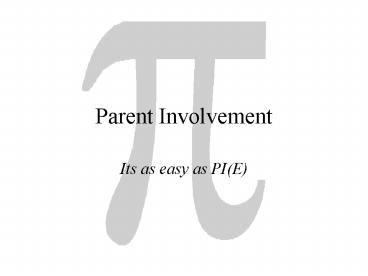Parent Involvement - PowerPoint PPT Presentation
1 / 13
Title:
Parent Involvement
Description:
Many parents who are actively involved in the education of their children at the ... However, parent involvement in a child's education during the middle school ... – PowerPoint PPT presentation
Number of Views:2988
Avg rating:3.0/5.0
Title: Parent Involvement
1
Parent Involvement
- Its as easy as PI(E)
2
Parent Involvement at the Middle School
LevelACCESS ERIC, with funding from the Office
of Educational Research and Improvement, U.S.
Department of Education and is in the public
domain.
- Many parents who are actively involved in the
education of their children at the elementary
school level become less involved when their
children reach middle school. - However, parent involvement in a child's
education during the middle school years (ages 10
to 14) is just as important in a child's success
at school as it is in earlier grades. If the
school doesn't have a formal participation plan
for parents, it is important that parents take
the initiative to continue their involvement and
collaboration in their children's school.
3
What Are Middle Schoolers Like?
- As children grow, they begin to experience
physical, - intellectual, and emotional changes.
- The way they learn, feel, see the world, and
relate to other - people becomes different from when they were
younger. - These changes, along with demands from
present-day society and peer pressure, create
conflicts and tension in the adolescent, which
are reflected in their behavior in school and at
home.
4
- Young people at this age show a good number of
- contradictions and conflicts, which is normal.
- There is no "model" adolescent. All young persons
are - individuals with strong and weak points and with
- positive and negative qualities.
- There are some common characteristics that should
be - kept in mind in order to understand and help the
middle - schooler in daily activities at home and at
school
5
- Adolescents have high levels of physical and
emotional energy, which may contrast with long
periods of idleness, generally disapproved of by
adults. - They take risks, are curious, and love danger and
adventure, yet their feelings can be hurt easily.
This is the time when they feel immortal, but
they worry a lot about what their friends think
about them. - They want to be independent from their families,
and at the same time, they need to be pampered
and protected. - They withdraw and want a private life, and at the
same time, they worry about being accepted by
their peers. - They demand privileges, but avoid
responsibilities. At the same time, they are
developing an awareness of social problems and
the welfare of others.
6
Cultural Awareness
- Adolescents from other cultures sometimes
- face an additional burden as they develop
- their identities and try to comply with the
- requirements of home and school.
- On one side, they have the values and customs of
- the home that the family wants to maintain,
- and on the other, they have to respond to the
- demands of their peers and teachers, who
- have a different set of rules.
7
Why Is It Important For Parents To Be Involved at
the Middle School Level?
- The results of recent research are very clear
- When parents are actively involved in their
children's - education, they do better in school. The academic
level of - the parents, their socioeconomic level, and their
ethnic or - racial origin are not determining factors for
- academic success. It is essential for parents to
have a - positive attitude regarding education, and to
demonstrate - trust that their children can do well.
8
How Will Your Children and Your School Benefit
From Your Involvement?
- When parents become involved, both students
- and school benefit
- Grades and test results are higher
- Students' attitudes and behavior are more
positive - Academic programs are more successful
- The schools, as a whole, are more effective.
9
Hollenbecks Core Ethical Values
- Respect
- Responsibility
- Honesty
- Kindness
Huddle Up is a collaborative program developed
by the St. Louis Rams Foundation and
CHARACTERplus to help educators integrate
character-building into their curriculum.
Hollenbeck was selected to participate in the
Huddle Up Advisory project to develop effective
advisory classes. Effective advisories increase
the character-building capacity of an entire
school as its strengths both academic skills and
the sense of community students experience.
The objectives of the Huddle Up Advisory are
to Increase students academic confidence and
competence Increase students sense of autonomy
or voice in the learning environment Increase
students sense of belonging with each other and
school community Positively influence a culture
of personal and academic excellence
10
EXPECTATIONS
- Academic
- Team Expectations
- Be on time to class
- Turn work in on time
- Try your very BEST
- Use your Assignment Notebook
- Homework Hotline
- Personal
- Treat others with kindness and respect
- Dont Gossip
- Keep hands and feet to yourself
- NO BULLYING
- NO FIGHTING
11
Concerns
- Attendance
- Bus
- Physical Contact
- Name Calling
- Cell Phones
- Hallway Behaviors
- Responsibility
12
Parent Perspective
- How can we help you?
13
Resources/Links
- http//www.characterplus.org/
- http//www.educationworld.com/a_special/parent_inv
olvement.shtml - http//www.middleweb.com/ParntInvl.html
- http//hollenbeck.fhsd.k12.mo.us/
- Berkowitz, Marvin. (2005). Parenting for Good,
Real World Advice for Parents from the Character
Columns of Dr. Marvin w. Berkowitz. Chapel Hill,
NC Character Development Group































